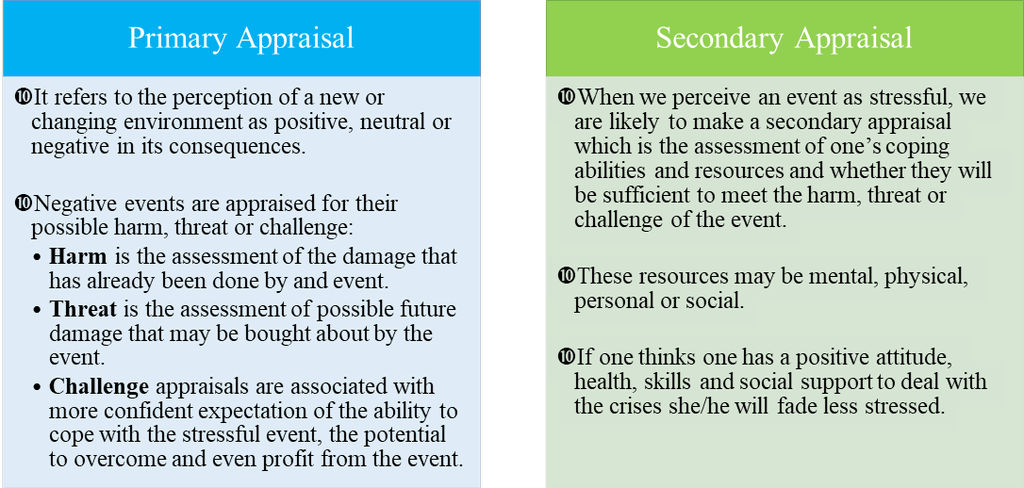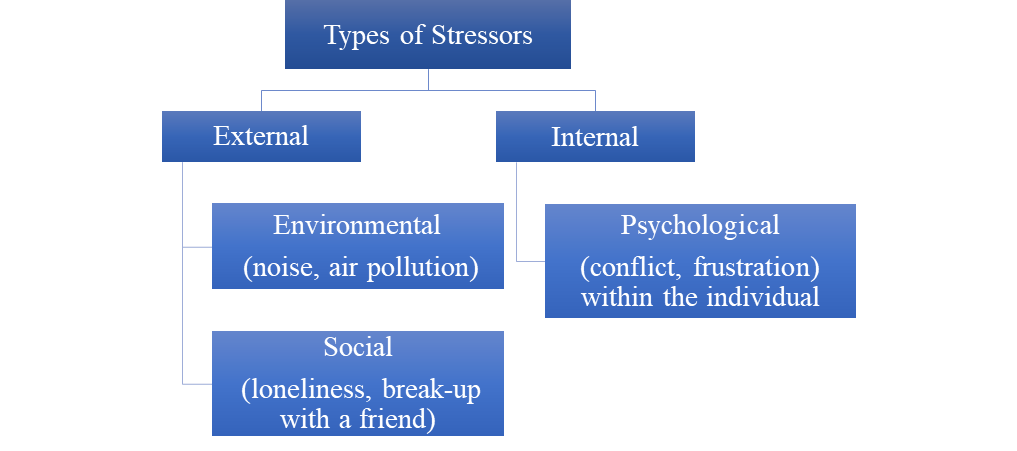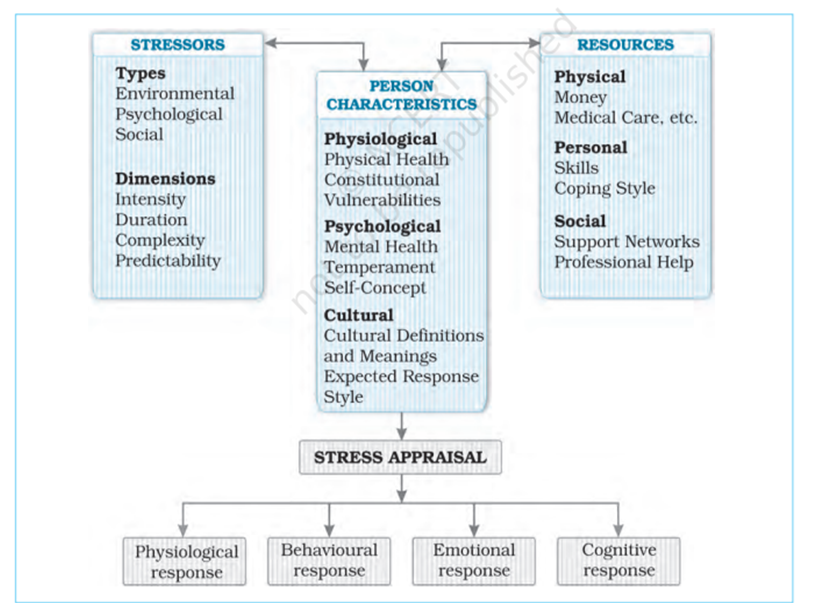- Books Name
- Psychology Book Class-12
- Publication
- PathSet Publications
- Course
- CBSE Class 12
- Subject
- Psychology
Stress
Nature of Stress
- All the challenges, problemsand difficult circumstances put us to stress.
- If stress is handled properly, stress increases the probability of one’s survival.
- Stress gives energy, increases human arousal and affects performance.
However, high stress can produce unpleasant effects and cause our performance to deteriorate.
Conversely, too little stress may cause one to feel somewhat listless and low on motivation which may lead us to perform slowly and less sufficiently.
- ‘Eustress’ is the term used to describe the level of stress that is good for you and is one of a person’s best assets for achieving peak performance and managing minor crisis.
- ‘Distress’ is the kind of stress that causes our body’s wear and tear.
- Stress is the pattern of responses an organism makes to stimulus event that disturbs the equilibrium and exceeds a person’s ability to cope.
- Stress comes from the Latin word ‘strictus’ (noun) and ‘stringere’ (verb) meaning tight or narrow.
- Stressors are events that cause our body to give the stress response.
ex- noise, crowding, bad relationships, etc. - The reaction to external stressors is called ‘strain’.

- Stress is associated with both the causes as well as effects.
- Hans Selye (the father of modern stress research) defined stress as “the non- specific response of the body to any demand” i.e., regardless of the cause of the threat, the individual will respond with the same physiological pattern of reactions.
- Some researchers feel that different stressors may produce somewhat different patterns of stress reaction, and different individuals may have different characteristic modes of response.
- Stress is not a factor that resides in the individual or the environment, instead it is embedded in an ongoing process that involves individuals transacting with their social and cultural environment, making appraisals of those encounters and attempting to cope with the issues that arise.
Stress is a dynamic mental/cognitive state. It is a disruption in homeostatic or an imbalance that gives rise to a requirement for resolution of that imbalance or restoration of homeostasis.
- The perception of stress is dependent upon the individual’s cognitive appraisal of events and the resources available to deal with them.
- An individual’s response to a stressful situation largely depends upon the perceived events and how they are interpreted or appraised.
- Lazarus has distinguished between two types of appraisals:

This two-level appraisal process determines not only our cognitive and behavioral responses but also our emotional and physiological responses to external events.
- These appraisals are very subjective and depend on the following factors:
- Past experiences of dealing with such a stressful condition.
If one has handled similar situations very successfully in the past, they would be less threatening for him/her.
Controllability
- Whether the stressful event is perceived as controllable i.e., whether one has mastery or control over a situation.
- A person who believes that she/he can control the onset of a negative situation, or its adverse consequences, will experience less amount of stress than those who have no such sense of personal control.
- A sense of self-confidence or efficacy can determine whether the person is likely to appraise the situation as a threat or a challenge.
Thus, the experience and outcome of a stressor may vary from individual to individual.
- Stress includes all those environmental and personal events which challenge or threaten the wellbeing of a person.
These stressors can be:

- These stressors result in a variety of stress reactions which may be physiological, behavioral, emotional and cognitive.
- At the physiological level, around plays a key role in stress-related behaviors.
The hypothalamus initiates action along 2 pathogens:
- The first pathway involves the autonomic nervous system. The adrenal gland releases large amount of catecholamines (epinephrine and norepinephrine) into the blood stream. This leads to physiological change seen in fight- or flight response.
- The second pathway involves the pituitary gland, which secretes the corticosteroid (cortisol) which provides energy.
- The emotional reactions to experience of stress include negative emotions such as fear, anxiety, embarrassment, anger, depression or even denial.
- The behavioral responses are virtually limitless depending on the nature of the stressful event.
- Confrontative action against the stressor (fight), or
- Withdrawal from the threating event (flight)
- Cognitive responses include belief about the harm or threat an event poises and beliefs about its causes or controllability. These include responses such as inability to concentrate, and intrusive, repetitive on morbid thoughts.
- The stresses which people experience also vary in terms of:
- Intensity (low intensity vs. high intensity)
- Duration (short term vs. long term)
- Complexity (less complex vs. more complex)
- Predictability (unexpected vs. predictable)
The outcome of stress depends on the position of a particular stressful experience along these dimensions.
Usually more intense, prolonged or chronic, complex and unanticipated stresses have more negative consequences than have less intense, short-term, loss complex and expected stresses.
- An individual’s experiences of stress depend on:
- The physiological strength of that person. Thus, individuals with poor physical health and weak constitution would be more vulnerable than would be those who enjoy good health and strong constitution.
- Psychological characteristics like mental health, temperament, and self-concept are relevant to the experience of stress.
- The cultural context in which we live determines the meaning of any event and defines the nature of response that is expected under various conditions.

Signs and Symptoms of Stress
- The way we respond to stress varies depending upon our personality, early upbringing and life experiences.
- The warning signs may vary, as may their intensity as everyone has their own patterns of stress response.
- The depth of the problem may be assessed by the nature and severity of our own symptoms or changes in behavior.
- These symptoms of stress can be physical, emotional or behavioral.
Following are the signs of stress:
- Lack of concentration
- Memory loss
- Poor decision-making
- Inconsistency
- Irregular attendance and timekeeping
- Low self-esteem
- Poor long-term planning
- Frantic bursts of energy
- Extreme mood swings
- Emotional outbursts
- Worry
- Anxiety
- Fear
- Depression
- Difficulties with sleep
- Difficulties with eating
- Misuse of drugs
- Physical illness, e.g. stomach upset, headache, backache, etc.
Types of Stress(All the 3 types of stress are interrelated)
Physical and Environmental Stress
- Physical stresses are demands that change the state of our body. We feel strained when we overexert ourselves physically, lack a nutritious diet, suffer and injury, or fail to get enough sleep.
- Environmental stresses are aspects of our surroundings that are often unavoidable such as air pollution, crowding, noise, heat of the summer, winter cold, etc.
- Another groups of environmental stresses are catastrophic events or disasters such as fire, floods, earthquake etc.
Psychological Stress
- Stresses that we generate ourselves in our minds.
- Personal and unique to the person experiencing them.
- Internal sources of stress.
- These are not only symptoms of stress, but they cause further stress for us.
- Exists when we worry about problems, feel anxiety, or become depressed.
- Some of the important sources of psychological stress are:
a) Frustration results from the blocking of needs and motives by something or someone that hindersus from achieving a desired goal.
Cause of frustration-social discrimination, interpersonal hurt, low grades in school, etc.
b) Conflicts may occur between two or more incompatible needs or motives. Ex-whether to study dance or psychology.
There may be a conflict of values when one is pressurized to take any action that may be against the values held by the person.
c) Internal pressures stem from beliefs based upon expectations from inside us to ourselves such as- ‘I must do everything perfectly’.
Such expectations can only lead to disappointment. Many of us drive ourselves ruthlesslytowards achieving unrealistically high standards in achieving our goals.
d) Social pressures may be brought about from people who make excessive demands on us.
This can cause even greater pressure when we have to work with them.
‘A personality clash’ can cause even further interpersonal difficulties.
Social Stress
- Induced externally
- Results from our interaction with other people.
- Vary widely from person to person.
- Ex- social events like death or illness in the family, strained relationships, trouble with neighbors .
Sources of Stress
Life events
- Changes, both big and small, sudden and gradual affect our life from the moment we are born.
- We learn to cope with small, everyday changes but major life events can be stressful, because they disturb our routine and cause upheaval.
- If several of these life vents that are planned or unpredicted occur within a short period of time, we find it difficult to cope with them and will be more prove to the symptoms of stress.
Hassles
- Personal stresses we endure as individuals due to the happenings in our daily life:
- Noisy surroundings
- Electricity and water shortage
- Traffic snarls
- Quarrelsome neighbors
- Daily hassles may sometimes have devastating consequences for the individual who is often the one coping alone of them as outsiders.
- The more stress people report as a result of daily hassles, the poorer is their psychological well-being.
Traumatic events
- Include being involved in a variety of extreme events such a fire, train or road accident, tsunami,robbery, earthquake, etc.
- Effects of these events may occur after some lapse of time and sometimes persist as symptoms of anxiety, flashbacks, dreams and intrusive thoughtsetc.
- Severe trauma can also strain relationships.
- Professional help will be needed to cope with them especially if they persist for many months after the event is over.

 PathSet Publications
PathSet Publications
